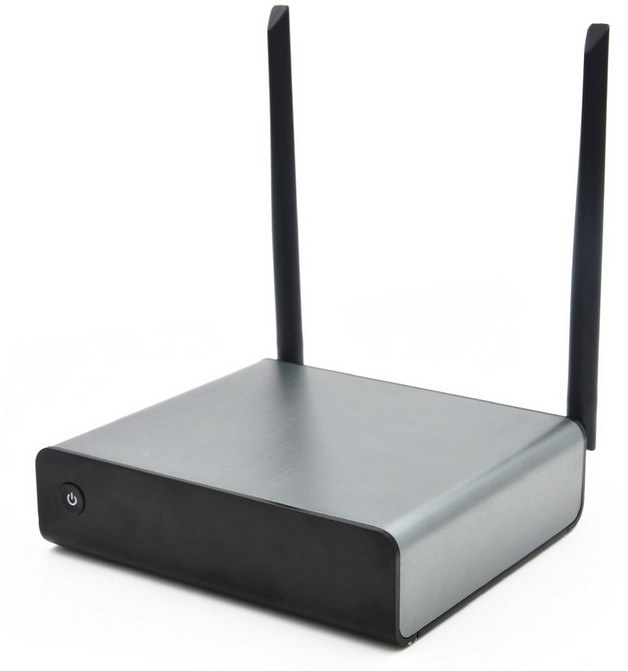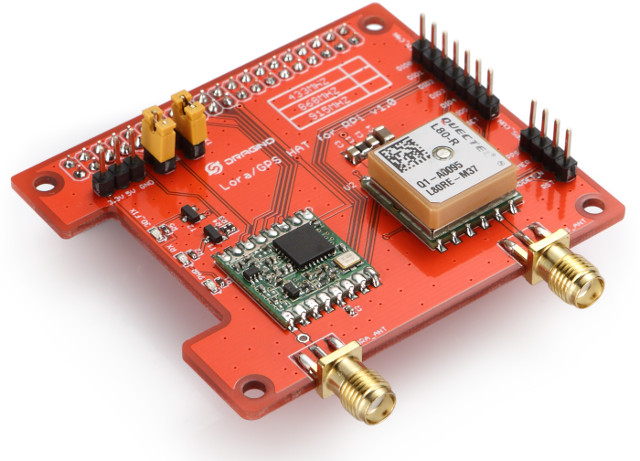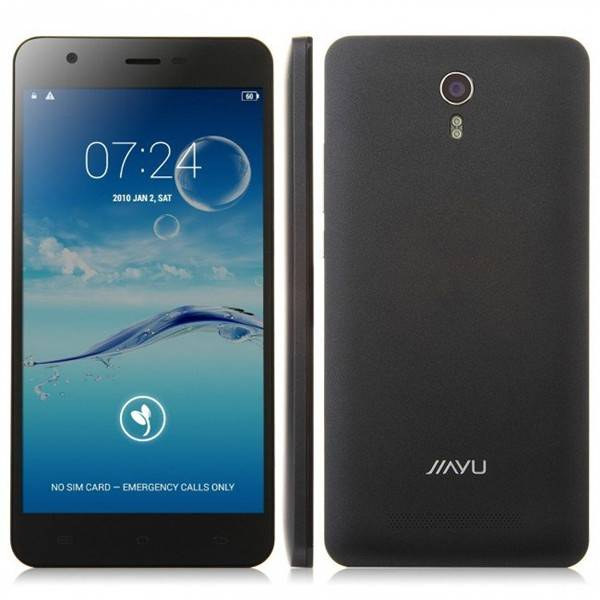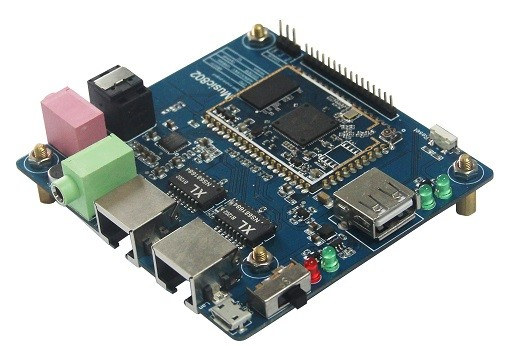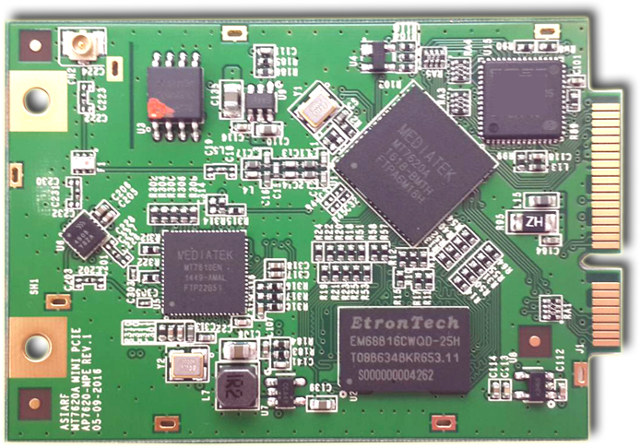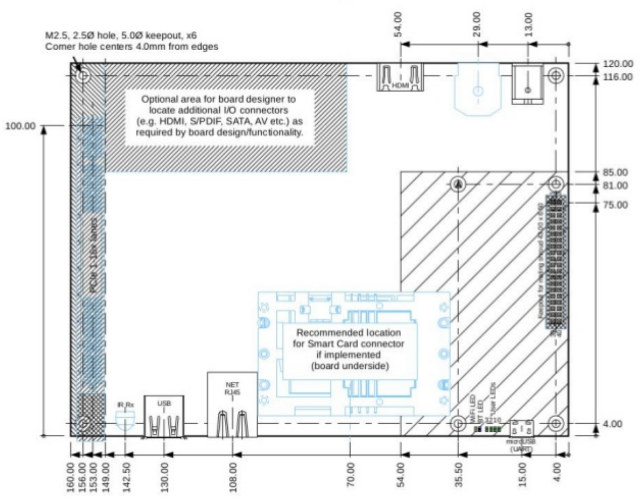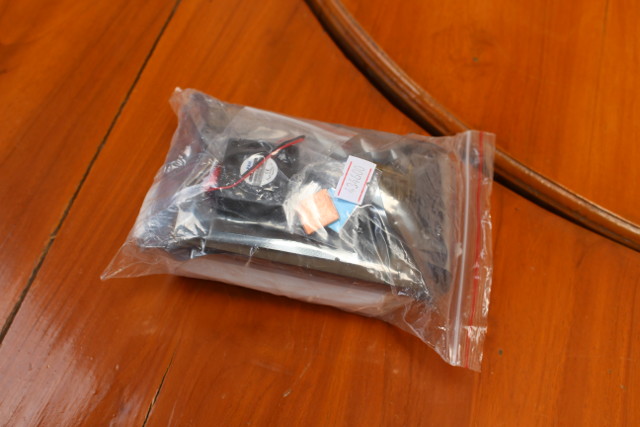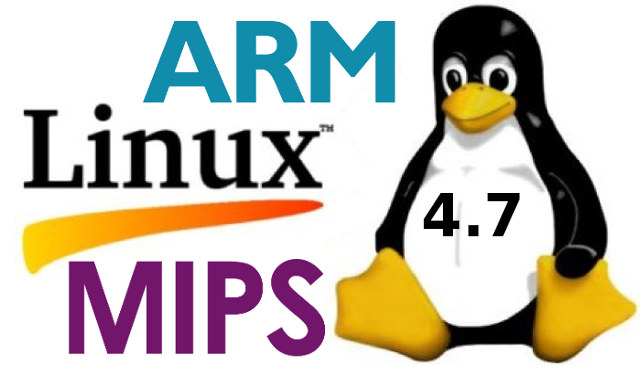MeLE showcased their PCG61U mini PC powered by an Intel Celeron N3150 processor and running Ubuntu last April at the Hong Kong Electronics Fair. The company has now launched Star Cloud PCG61 on Aliexpress where it sells for $149 and up with either Windows or Ubuntu. Star Cloud PCG61 specifications: SoC – Intel Braswell Celeron N3150 quad core processor @ 1.60/2.08 GHz with 12 EU Gen8 Graphics(6W TDP) System Memory – None, 4 or 8GB DDR3L Storage – 0, 64 or 128 GB mSATA SSD (upgradeable up to 256GB), micro SD card up to 512GB Video Output – HDMI 1.4 & VGA Audio – HDMI, 3.5mm microphone and earphone jack Connectivity – Gigabit Ethernet, 802.11 b/g/n & 802.11ac WiFi, and Bluetooth 4.0 USB – 2x USB 3.0 ports, 2x USB 2.0 ports Misc – Power button, Kensington security lock, reset BIOS button, mini PCIe slot (likely already used by wireless […]
Dragino LoRa/GPS HAT Board for Raspberry Pi Sells for $32
There are several ways to play with LoRaWAN protocol on the Raspberry Pi including RisingHF Discovery kit or Cooking Hacks LoRa Shield for Raspberry Pi, but the latter requires you to spend close to $100 just for the shield, the complete Lora discovery kit costs close to $400. Dragino Tech LoRa/GPS HAT board should be a more cost effective way to get started with LoRa on Raspberry Pi, as it sells for $32 + shipping on Tindie. Dragino LoRa/GPS HAT specifications: Connectivity LoRa Semtech SX1276/SX1278 transceiver @ 433/868, or 915 MHz (Country dependent, pre-configured in the factory) 168 dB maximum link budget. +20 dBm – 100 mW constant RF output vs. +14 dBm high efficiency PA. Programmable bit rate up to 300 kbps. GPS L80 GPS module based on Mediatek MT3339 SoC Horizontal Position Accuracy: autonomous <2.5 m CEP. TTFF@-130dBm with EASY (AGPS): Cold Start <15s,Warm Start <5s,Hot start <1s; […]
Jiayu S3 and S3 Plus Smartphones Get Android 6.0 Firmware Releases with Source Code
Jiayu S3 and S3 Plus are your typical Android smartphones powered by Mediatek MT6752/MT6753 octa core Cortex A53 processor with 3GB RAM, 16GB flash, and a 5.5″ touch screen display. The news here is that Jiayu Germany (a reseller, not the manufacturer), and Team M.A.D (Mediatek Android Developers) comprised of XDA members, have releasing three custom ROMs based on Android 6.0.1 for the smartphone: Cyanogenmod13, Paranoid Android (AOSPA) and AICP (Android Ice Cold Project), which contrast with my Iocean MT6752 smartphone still stuck on Android 4.4.4. I’ll reproduce the technical specifications of Jiayu S3+ phone for reference: SoC- Mediatek MT6753 Octa-core 64-bit ARM Cortex A53 processor @ 1.3 GHz, with ARM Mali-T720 GPU System Memory – 3GB RAM Storage – 16 GB eMMC + micro SD slot up to 64GB Display – 5.5” IPS capacitive touchscreen display; 1920×1080 resolution Connectivity – 802.11 b/g/n/ac Wi-Fi , Bluetooth 4.0, GPS / A-GPS, FM Radio Cellular […]
Music802 Linux Audio & IoT Board is Powered by Atheros AR9331 SoC (Crowdfunding)
When Link Card evaluated processors for a Linux audio IoT board, they considered candidates like Allwinner H3 and Ralink RT5350, but eventually went with Atheros AR9331 due to cost, simplicity, features, and power consumption reasons for their Music802 board based on LC930 system-on-module. Music802 board specifications: SoC – Atheros AR9331 MIPS 24K WiSoC @ 400 MHz System Memory – 64MB DDR2 Storage – 16MB SPI Flash Audio – Cirrus Logic WM8960 Codec; 2x 3.5 mm jacks for Line IN and headphone; optical S/PDIF output; on-board microphone Connectivity – 2x 10/100M Ethernet ports (WAN & LAN), 802.11 b/g/n WiFi with 1x IPEX antenna connector USB – 1x USB 2.0 host, 1x micro USB port for power only Debugging – 3-pin 2.54mm pitch header for serial console Expansion – 16-pin 2.0mm pitch header for GPIO, UART, I2C, etc.. Misc – Power, system, and 2x user LEDs, 1x reset button, 1x power switch […]
AsiaRF AP7620-MPE-1 OpenWrt WiFi Router mini PCIe Card is Made for Computers and Embedded Systems
There are many mini PCIe WiFi modules on the market, but what AsiaRF provides with AP7620-MPE-1 is a little different, as it’s a router based on Mediatek MT7620A fitted into a mini PCIe card to be plugged inside a computer or embedded system. AP7620-MPE-1 mini PCIe card specifications: SoC – Mediatek MT7620A MIPS 24KEc CPU @ 580MHz with 2T2R WiFi 802.11 b/g/n (but board only supports 1×1) 802.11ac WiFI Chipset – Mediatek MT7612E AC1200 chipset limited to 433 Mbps [Changed to MT7610E chipset @ 433 Mbps] System Memory – 64 or 128MB DDR2 Storage – 8 or 16MB SPI flash WiFI features Security: 64/128-bit WEP, TKIP, WPA, WPA2, AES; 802.1X Authentication with RADIUS Client Multi-mode support: Access Point/Client mode Support Multiple SSIDs mini PCIe interface with USB2.0 to Ethernet, UART, 8 GPIOs, 1.5V, 3.3V and ground Dimensions – 60 x 41.5 mm (bigger than standard mini card: 50.95 x 30 […]
96Boards Gets a TV Platform Edition Targeting $50 Mid-range Boards, $99 High-end Boards
96Boards was born as a hardware and software standard with Consumer (CE) & Enterprise Editions (EE), with different form factors with the latter focusing on server boards, but with similar software requirements requiring recent and mostly open source software. The consumer edition was also split into “Standard” and “Extended” editions, which the latter allowing for larger boards with more features, while the Enterprise Edition has its own larger format, as well as an option for micro-ATX form factor. I’ve just learned that a “fifth” 96Boards standard has been worked on with 96Board TV Platform for Home Gateways, OTT Streaming boxes, and TV boards with prices target of $50 or lower for mid-range boards, and $99 or lower for high-end boards. 96Boards TV Platform hardware requirements: Dimensions – 160 x 120 mm (EE Standard form factor) RAM – 1GB minimum; 2GB recommended Flash – 8GB eMMC minimum WiFi – 802.11 g/n […]
Raspberry Pi Club Battery / UPS Kit Assembly Guide and Review
A couple of months ago, I wrote about a Raspberry Pi battery kit with a 3,800 mAh battery, a battery control board, an acrylic enclosure, and an heatsink + fan set that I found on DealExtreme for about $22. I decided to buy it once I got confirmation the battery was included, and so today I’ll write about my experience assembling the kit, and running it with a Raspberry Pi 2 board. If you are only interested in the “RPi PowerPack” battery control board and battery, you can find them on Banggood for $11.93. Raspberry Pi Club Battery Kit Unboxing DX put all the accessories inside a zip bag, and shipped it in a bubble envelop. It contains a white box with the RPi PowerPack V1.0 battery and battery, several screws, spacers, and bolts sets, a fan with screws, an acrylic case with three layers, an heatsink set with two […]
Linux 4.7 Release – Main Changes, ARM and MIPS Architectures
Linux 4.7 is out: So, after a slight delay due to my travels, I’m back, and 4.7 is out. Despite it being two weeks since rc7, the final patch wasn’t all that big, and much of it is trivial one- and few-liners. There’s a couple of network drivers that got a bit more loving. Appended is the shortlog since rc7 for people who care: it’s fairly spread out, with networking and some intel Kabylake GPU fixes being the most noticeable ones. But there’s random small noise spread all over. And obviously, this means that the merge window for 4.8 is open.Judging by the linux-next contents, that’s going to be a bigger release than the current one (4.7 really was fairly calm, I blame at least partly summer in the northern hemisphere). Linus Linux 4.6 brought USB 3.1 superspeed, OrangeFS distributed file system, 802.1AE MAC-level encryption (MACsec), and BATMAN V protocol support, improved […]


